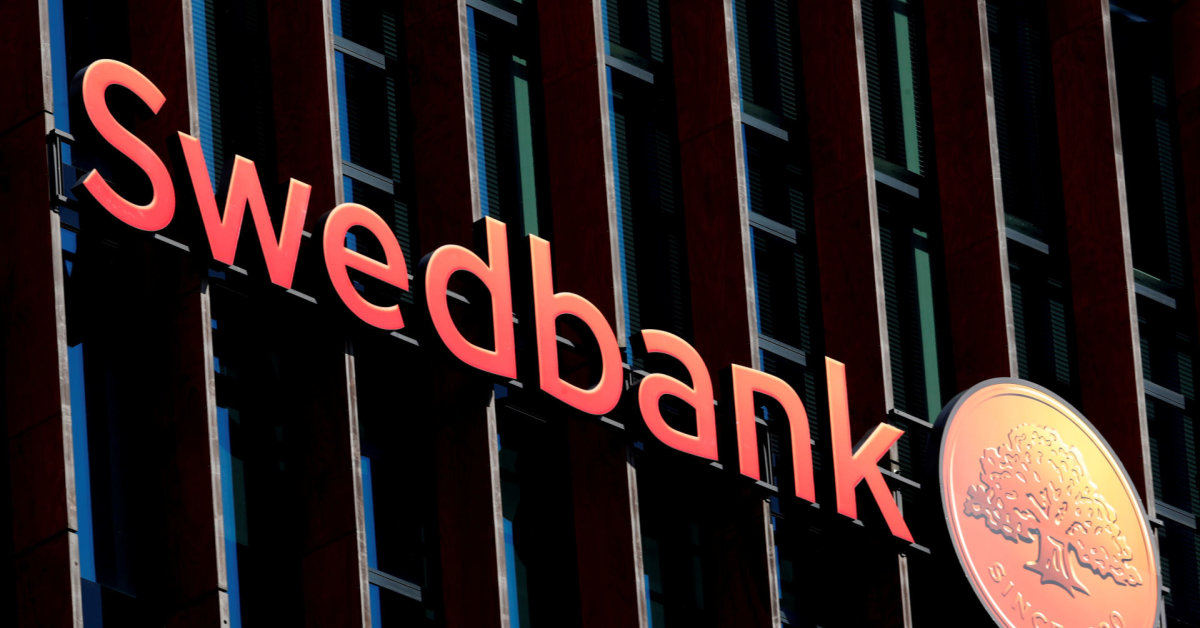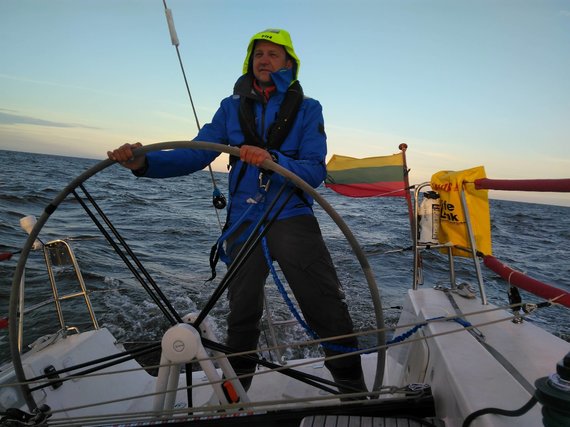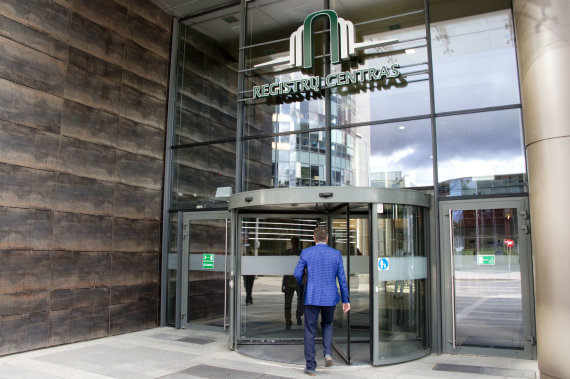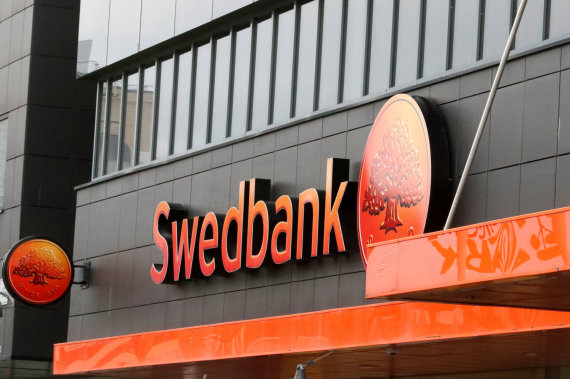
[ad_1]
Ričardas Novošinskas, founder and manager of the small company SailRacer, which produces software and electronics for sailing competitions, says he is forced to look for opportunities to start a business in Lithuania.
The businessman is outraged that the company, which uses a mobile application developed by some 20,000 sailors worldwide, has no money. Swedbank blocked their SailRacer account on Wednesday.
Swedbank is implementing a “Know Your Customer” money laundering prevention program, the goal of which is to meet the companies’ final shareholders. R.Novošinskas assures that for six consecutive months he brought new documents required by the bank, but nobody helped.

Photo from personal archive / Ričardas Novošinskas
“On Wednesday, Swedbank blocked the company’s account under the pretext of the solid ‘Know your customer’ principle. From now on, we cannot settle accounts with suppliers, pay wages: we are forced to look for alternatives to take the business out of Lithuania ”, R. Novošinskas did not hide his disappointment, adding that during 8 years of operation, the company he has managed has won several prestigious nominations for innovation.
When Swedbank locks your account, the company’s operations stop because the company does not have the ability to pay the server rent.
“It is very difficult to operate, because it is critical for us to pay for the servers every month. We will try to pay from another company, sign a debt transfer note. Everything stops. Maybe we will stretch this mode for a couple of months” , – the businessman is concerned about the future.
The company gets all of its revenue from Google, Apple, Amazon and Paypal.
Ask for shareholders in the Netherlands
SailRacer is not the first company to find itself in this situation. Banks are stopping some companies to get to know their customers better and to know their shareholders. 15 minutes has written before.
The same happened with the forwarding company Klaipeda NK Spedition, which belongs to a large Dutch transport services company. Both representatives in Lithuania and shareholders in the Netherlands provided Swedbank with a variety of information about themselves, but nothing helped: the company’s account was closed and the Dutch decided to move the business to Poland.
Meanwhile, SailRacer’s history with the bank has been going on for about half a year.
According to R. Novošinskas, the main problem is that a shareholder of the company is the company Brakoz B.V., which owns 40 percent. the shares are not registered in Lithuania but in the Netherlands. The latter company has two shareholders, legal persons also registered in the Netherlands, whose shareholders are already natural persons.
According to R. Novošinskas, until now Swedbank only had a list of shareholders of a Lithuanian company, but this year a chain of shareholders was required for all natural persons.

Managed by Cabbage / 15min photo / Register Center
R. Novošinskas says that he has submitted all the documents requested by Swedbank: an extract from the Registration Center on the shareholders of UAB SailRacer, documents on the establishment of the company, an “elaborated” scheme of beneficiaries for natural persons, an extract from the Center Dutch Records at Brakoz BV
The last statement was rejected by the bank because the apostles were over a year old. At that time, R. Novošinskas presented a new extract from the Dutch Records Center on Brakoz B.V., as well as extracts from the latter’s shareholders (Gerant B.V. and Swanenberg Holding B.V.).
These were also not adequate because, according to the bank, the documents presented “do not reflect the proportion of shares.” Swedbank then asked Brakoz B.V. to provide documents that reflect the actions.
“Introducing” Brakoz B.V. “Articles of association, reflecting the proportions of the shares, but that document was also inappropriate, since it is not notarized, without an apostille and has not been translated into Lithuanian and, for some reason, into Russian. The pandemic started later, shareholders do not respond to letters, we cannot obtain notarized founding documents. We asked to extend the period until the end of the quarantine in Lithuania and the Netherlands, but Swedbank simply blocked the account, ”said R. Novošinskas.
The businessman is surprised that it has become more difficult to provide information to the bank than to establish a company in Lithuania.
“He requests notarized documents with apostille translated into Lithuanian, ten times more difficult to present documents to the bank than when establishing a company for a notary. Part of the information is in the Lithuanian Registry Center, it can be accessed, but it requires the client to provide it ”, the businessman resented.
The biggest difficulties are with foreign shareholders.
R. Novošinskas stated that the biggest difficulties with this bank survey are caused by companies whose shareholders are companies registered abroad. After all, foreign investors do not always agree to disclose to the final owners, individuals, even partners in Lithuania.
Incidentally, companies often relocate to countries such as the Netherlands, Cyprus or Malta, not only because of lower taxes, but also because of restrictions on third parties to obtain information on beneficiary shareholders.
R. Novošinskas, who has not recently received the documents requested from foreign investors, does not know whether he is not receiving them due to quarantine or due to the reluctance of shareholders to disclose them.
“I think both because of the quarantine and because that information about the founders of another company is not my concern.” I don’t think I have much of a right to ask, because the shareholders of another company are not public: public for certain institutions, but not for individuals, “says R. Novošinskas, who controls the controlling stake in the company. No response.
He considered that if the situation was not resolved, he would have to think about whether to move the company, close it or buy shares.
“Either the law is too strict, or Swedbank is too jealous about it, because in other countries, banks tackle money laundering prevention issues by tracking transactions rather than requesting unconscious documents that they legally could not obtain without the consent of corporate shareholders, “he said.
Swedbank does not reveal how many accounts have been blocked
15 minutes He asked Swedbank how many customer accounts the bank had blocked due to the Know Your Customer program, but did not receive a response. The bank declined to provide this data, arguing it was a trade secret.
Swedbank also declined to comment on the SailRacer situation, arguing that no comments could be made without the consent of the client.

Reuters / Scanpix Photo / Swedbank
In accordance with the “Know your customer” principle, the bank declares that it needs to know who the customer is and what their normal activities are and who the customer’s beneficiary is.
True, Swedbank spokesman Saulius Abraškevičius 15 minutes He said that in all cases, the bank informs clients about deadlines for sending documents and possible account lockouts if the required documents are not sent.
“The bank’s communication on customer cognition says that customers who have difficulty submitting documents during quarantine should inform the bank about this and agree on longer terms to send documents to the bank individually,” says S. Abraškevičius.
R. Novošinskas objects that the bank did not consider requests to extend the term.
S. Abraškevičius also stated that Swedbank’s general terms and conditions of customer service and service provision, which are an integral part of all agreements between the bank and the customer, state that if the documents submitted to the bank are in a foreign language, the bank has the right require that they be translated into Lithuanian.
Furthermore, the translation of documents into Lithuanian must be certified by a competent translator and / or a notary acceptable to the bank. Depending on the circumstances, the bank also accepts translations into English or Russian upon customer request.
“Documents issued abroad are valid in Lithuania only if they are legalized or if the signature of the official who certified them is confirmed by an Apostille certificate in accordance with the 1961 Law. October 5 The Hague Convention on Abolition of the Legalization of Documents Issued in Foreign States, except in cases where international agreements between Lithuania and the respective foreign state establish otherwise, ”said S. Abraškevičius.
[ad_2]